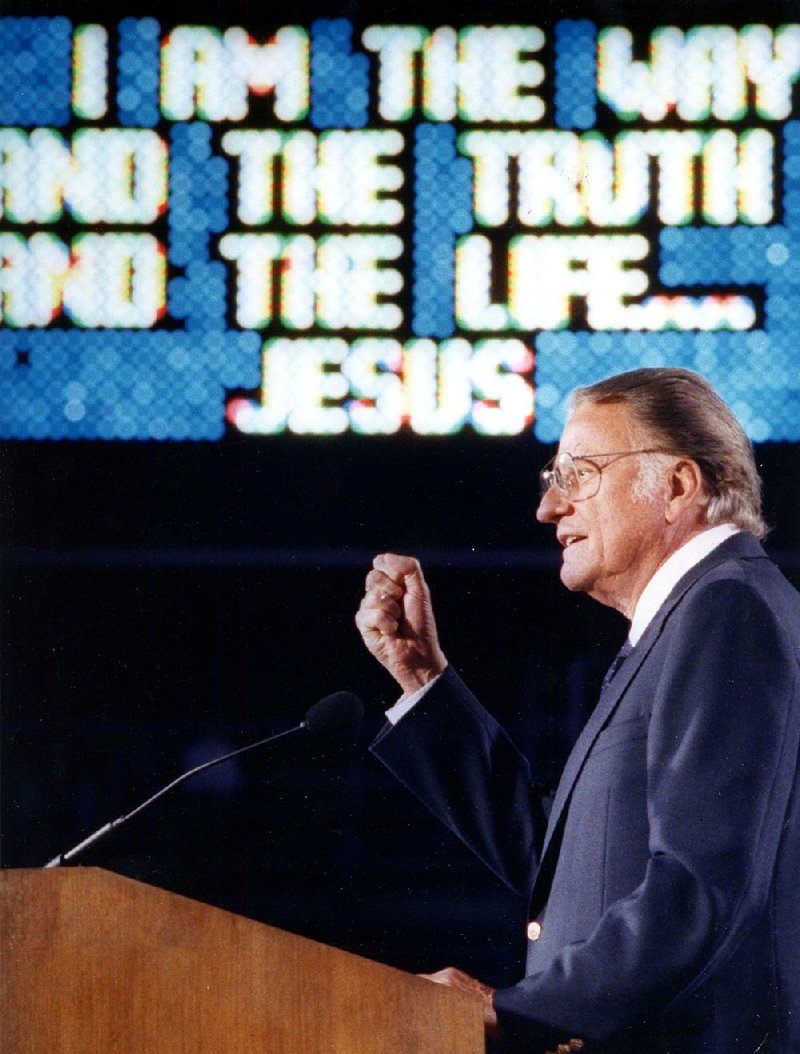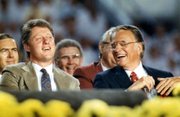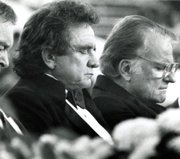It was, perhaps, a bad omen.
Frank Broyles' dog bit Billy Graham's son.
And on the morning of the Big Shootout, no less.
The Arkansas Razorbacks lost that football game in 1969 to the Texas Longhorns by a score of 15-14, with Graham delivering the invocation before the game in Fayetteville.
[PREVIOUS COVERAGE: Read about Graham's visits to Arkansas]
Graham's son Ned, 11 years old at the time, suffered only a superficial wound from Broyles' German shepherd Lady.
But still, Broyles was mortified.
"That's why we lost!" he would tell people for years to come.
The story was retold in George Schroeder's book Hogs! A History.
Click here for larger versions
Photos by The Associated Press
Photos by The Associated Press
Graham died Wednesday, six months after Broyles, who was the former football coach and athletic director at the University of Arkansas, Fayetteville.
On Wednesday, Arkansans and former Arkansans remembered their encounters with Graham.
"Hillary and I are saddened by the passing of our friend Billy Graham, one of the most important religious leaders in American history," former President Bill Clinton said in a statement emailed to the media. "His powerful words and the conviction they carried touched countless hearts and minds."
Clinton said he remembered seeing Graham at a revival in Little Rock in 1959, in the wake of the city's school desegregation struggle. Graham refused to segregate the crowd racially, which made an impression on the 12-year-old boy who would become president.
"He filled a football stadium with a fully integrated audience, reminding them that we all come before God as equals, both in our imperfection and our absolute claim to amazing grace," Clinton said. "Later as governor, in the White House, and afterward, I saw him live that faith fully in the constant kindness, encouragement, and counsel he extended to Hillary and me."
Gov. Asa Hutchinson said Graham's ministry was "without moral taint."
"It is not an exaggeration to say that Billy Graham was a giant among leaders," Hutchinson said in a statement. "But even as Dr. Graham counseled presidents and prime ministers, he resisted the overtures to engage in politics. Dr. Graham's devotion was to the Gospel, and his ministry to people regardless of their station in life."
Ronnie Floyd, senior pastor at Cross Church in Northwest Arkansas, said he had met privately with Graham and grew up listening to him preach.
"When I found out the news this morning, I was really moved by his death," said Floyd, who served as president of the Southern Baptist Convention in 2015 and 2016. "His influence on all Christianity is beyond words. You know, Dr. Graham was a giant for God. He was a one of a kind. A once-in-a-generation prophet of the truth of God and the grace of God. And it didn't matter where he was, [who] he was with, he was always calling everyone -- young and old, boys and girls -- to leave their chairs and to give their lives for Christ."
In September 1957, with the Little Rock desegregation crisis unfolding, Graham offered to visit the city if religious leaders believed it would help to lower tensions.
The offer was rejected.
In a telegram, religious leaders wrote, in part: "After prayerful consideration it is our conviction that you can be of more help to us when the heated tension is past."
Those signing on to the telegram included U.S. Rep. Brooks Hays, a Democrat who also served as president of the Southern Baptist Convention; Immanuel Baptist Church pastor W.O. Vaught; and the Rev. Dunbar Ogden, president of the Greater Little Rock Ministerial Association.
Graham would delay his visit until September 1959.
On Sept. 7, 1959 -- less than a week before the start of Graham's Little Rock crusade -- anti-integration terrorists attacked several targets, setting off explosions outside the mayor's office and the School Board building. Fire Chief Gann Nalley's station wagon also was damaged by dynamite.
The segregationist Capital Citizens Council and its chaplain, Wesley Pruden, distributed 40,000 fliers that urged Arkansans to skip Graham's crusades, portraying the preacher as an integrationist and emphasizing that the North Carolinian had once shared the stage in new York City with the Rev. Martin Luther King Jr.
The two-day crusade went on as planned, Saturday, Sept. 12, and Sunday, Sept. 13, at War Memorial Stadium.
Preaching Saturday night, Graham used John 3:16 as his text, highlighting God's love but also humanity's problems.
"We will never have world peace ... racial peace until man has come voluntarily back to God," he said. "God doesn't look on the color of the skin -- he looks on the heart of man. God knows all about you; he knows the motives of your life."
Before the service Sunday afternoon, which drew about 30,000 people, Graham visited the city jail and prayed with four men who faced charges in connection with the bombings.
Participating in a 1989 crusade in Little Rock was Ken Hatfield, who was the Razorbacks football coach at the time.
"I got up and basically shared my faith in Jesus Christ," Hatfield said.
But it was Graham who was the star of the show.
"I think his life speaks volumes for what he lived and stood for," Hatfield said. "An immeasurable number of lives were impacted by his simple message of accepting Jesus Christ."
Norma Barger made the trip to Little Rock with a group from her church, Howard General Baptist Church in Quitman, to see Graham preach at War Memorial Stadium in 1989.
"There was a big crowd there, a huge crowd, and there were people standing outside at their cars listening," she said. "They weren't in the stadium, but they wanted to hear him because they'd heard so much about him."
Barger remembers Graham being "down-to-earth."
"He could relate to people, to the common person," she said. "And I remember when he gave the invitation. From everywhere in the stadium, people were coming down to the altar."
Jack Graham, an 8-year-old Conway boy, attended the 1959 crusade. He would go on to serve as president of the Southern Baptist Convention.
"It was a powerful moment for me, and I can still hear the refrain of 'Just As I Am' reverberating through War Memorial Stadium," the Arkansas native and Dallas-area megachurch pastor said via email. "Billy Graham was influential in my life since that moment."
Billy Graham was good friends with Arkansas native Johnny Cash, who often appeared at his crusades, including the one in Little Rock in 1989.
Graham also visited John Brown University in Siloam Springs in 1959, said Julie Gumm, a spokesman for the school. Graham spoke at the first chapel of the semester in the Cathedral of the Ozarks, said Gumm.
Information for this article was contributed by Francisca Jones of the Arkansas Democrat-Gazette.
RELATED ARTICLE
http://www.arkansas…">Evangelist Billy Graham, 99, dies
Metro on 02/22/2018



